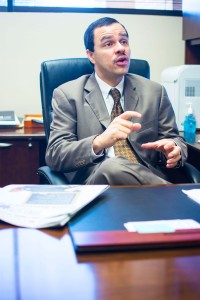By Rhiannon Saegert/managing editor

Carlos Morales is the first president of TCC’s virtual campus, dubbed TCC Connect for now, which combines Weekend College, distance learning and dual credit courses.
As president of TCC Connect, he plans to expand Weekend College and dual credit programs to every campus and develop new ways of creating online course material.
“The intention is that we provide district services for the entire college,” he said. “Weekend College is one of those. We are developing the plan and the concept for centralizing the economic offerings related to Weekend College.”
Weekend College will be geared toward focused students intent on finishing school quickly. Morales said the administration is working to incorporate prior learning experience assessments into Weekend College. The assessments would allow students to earn credit by proving they already have knowledge or skills they would earn in class.
TCC Connect will be in charge of managing and administering Weekend College on different campuses but will not alter the curriculum of the courses, he said.
“We will not be responsible for the curriculum although, of course, as time progresses will be in contact with different disciplines to maybe develop other programs, but the curriculum belongs to the district and is delivered through the different campuses,” he said.
TCC Connect is working with admissions and advising to find ways to help students graduate in a more timely manner.
“One challenge we have is there are a number of students that are graduating with more hours than they need, and we want to make sure that they advance with the number of hours and credits that they need,” he said.
Weekend College may begin enrolling students for classes in advance. Pre-enrollment, Morales said, will help students stay focused on their goals.
Dual credit courses on every campus now fall under the TCC Connect umbrella. The current goal is to incorporate each campus’ separate dual credit programs into TCC Connect.
“Right now, we are working on developing a common set of processes for that because it has been done in an individualized way in the past,” he said.
Morales said TCC Connect also must work with instructors to develop online classes to make sure they are comparable to traditional classes.
“In the case of distance learning, we are looking at redesigning the way that courses are developed, using master courses, working with faculty to develop those in teams, using a peer-review process for the development and peer review of those courses with the intention that we deliver the same product regardless of the location of that student,” he said.
Morales also said research has shown that instructors who begin teaching online courses as well as traditional courses often end up using some of the online teaching methods in the classroom.
As of now, no new instructors have been hired by TCC Connect.
Chancellor Erma Johnson Hadley said TCC Connect will allow the college to reach out to even more people.
“I’m hoping TCC Connect will provide more opportunities to expand,” she said. “The whole idea is to open up the college in different ways to people who perhaps have not accessed TCC because of various limitations.”
She said those limitations could be anything: work, child care, family obligations, transportation issues or just fear of a new environment.
NE natural sciences instructor and president of the NE faculty association Robert Edmonds said it is still too early to tell what faculty’s reaction to the changes will be.
“He’s hired some very good people,” he said. “It wouldn’t be fair to take any faculty assessment this early.”
So far, two people have joined the TCC Connect staff. Christine Hubbard is now the vice president of academic operations, and Jack Dalrymple is now the district director for dual credit.
























